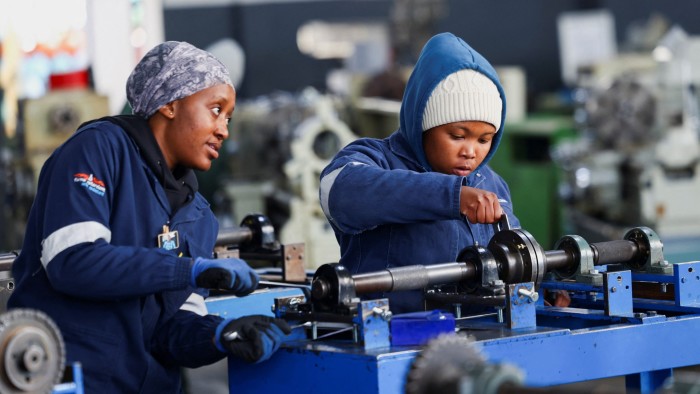South Africa has been racing to put in place “support measures” to help exporters hit by Donald Trump’s 30 per cent tariff, as political fallout over the country’s handling of talks with the US has intensified.
The tariff imposed on Africa’s most industrialised country is, along with those imposed on Libya and Algeria, the highest on the continent so far. Trump last week reiterated that he had “a lot of problems with South Africa”, citing its “very bad policies” and runaway crime rate.
While South Africa largely failed to sway Trump, despite President Cyril Ramaphosa visiting the White House in May accompanied by famous golfers, its neighbours have fared better.
Lesotho, which produces Levi’s and Wrangler for the US, initially faced a 50 per cent tariff that fell to 15 per cent, while Eswatini, which agreed to resettle violent criminals from US, was given a 10 per cent rate.
Ramaphosa said the country will nonetheless press the US to change its mind, while “accelerating” its search for new markets on the African continent, the Middle East and in Asia. “South African imports ultimately benefit US consumers in terms of both choice and cost,” he said.
 South Africa largely failed to sway Trump, despite President Cyril Ramaphosa (left) visiting the White House in May © Jim Lo Scalzo/EPA-EFE/Shutterstock
South Africa largely failed to sway Trump, despite President Cyril Ramaphosa (left) visiting the White House in May © Jim Lo Scalzo/EPA-EFE/Shutterstock
To mitigate the damage, South Africa set up an “export support desk” on Friday to advise exporters on finding new markets, and the government is set to announce details of a financial support package for affected companies later this week.
But the political backlash has widened, with the Democratic Alliance blaming leaders from the African National Congress, its partner in the coalition government, for botching the tariff negotiations.
“We have these tariffs now because the two critical government departments that could have made a difference — trade and international relations — have been missing in action,” Toby Chance, the Democratic Alliance spokesperson on trade, told the Financial Times.
Chance said this “diplomatic failure” is underscored by South Africa failing to replace Ebrahim Rasool, its ambassador to Washington who was expelled in March for referring to Trump as a “supremacist”.
“We’re reaping the consequence of years of ineptitude . . . it says a lot that South Africa’s neighbours have all negotiated their tariffs down to 15 per cent,” said Chance.
But Ronald Lamola, South Africa’s international relations minister, hit back at the DA for looking to score cheap political points. “Ambassadors do not negotiate any trade deals,” he told journalists on Monday.
Trade minister Parks Tau was adamant that South Africa had not botched the negotiations, saying negotiators tried for weeks to strike a deal and, two days before Trump’s announcement, were told by the US to “please give us an offer and we will respond”.
Tau said he believed the 30 per cent tariff could still be lowered.
Trade experts are sceptical that the government’s ‘support measures’ will mitigate the damage.
“I don’t see the National Treasury easily allocating extra cash, or signing off on tax relief for affected companies,” says Donald MacKay, founder of XA Global Trade Advisors.
“People talk as if you can easily replace the US but, as a consumer market, you don’t easily replace its depth. And if it was so easy to find new markets, we’d already be doing it.”
 South Africa produces the most sought after ostrich leather used in these ‘made in the USA’ cowboy boots with the raw material now hit with a 30 per cent US tariff © Ronaldo Schemidt/AFP/Getty Images
South Africa produces the most sought after ostrich leather used in these ‘made in the USA’ cowboy boots with the raw material now hit with a 30 per cent US tariff © Ronaldo Schemidt/AFP/Getty Images
MacKay says the tariffs will not be existential for the country’s economy, since only 7.5 per cent of South African exports land in the US.
More than a third of these exports include products currently exempted from tariffs — such as platinum, manganese, and pharmaceuticals.
In the worst case, South Africa’s Reserve Bank has calculated that the country’s GDP growth would be reduced by 0.69 per cent — a scenario that also factors in the rand depreciating by 15 per cent against the dollar.
Some sectors will get hit harder than others, with agricultural exports — like table grapes, citrus and wine — being the worst affected.
However, Wandile Sihlobo, the chief economist of the Agricultural Business Chamber of South Africa, told the FT the impact on the agricultural sector as a whole “may not be as significant as many have feared”.
“Only about 4 per cent of South African agricultural exports go to the US, but obviously this will have outsize implications for some areas, such as the Western Cape, KwaZulu-Natal and Mpumalanga, and for some companies,” he said.
Sihlobo said for these firms, the government’s support package will be vital — and could be enhanced if the state’s existing R1.5bn ($83mn) agricultural fund, run by the Land Bank, is repurposed to partly mitigate the damage.
